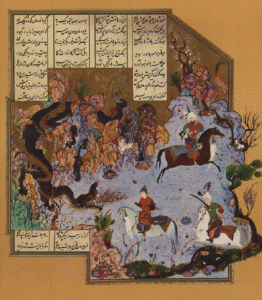Join Tessa Gratton and me as we read the Shahnameh by Abolqasem Ferdowsi. We’re using the Dick Davis translation (Penguin Classics).
Summary: In which Feraydun divides his lands into three parts for his three sons, and the two oldest becomes jealous that Iraj, the youngest, recieved the best part. They kill him, and Feraydun mourns spectacularly.

An illustration depicting the king, Feraydun, dividing his empire between his three sons. Feraydun is shown as a dragon and each son is mounted on a horse.
KE: Well. That was depressing. All my worst fears realized, and so very sad.
Here are a few of the particular things that interested me besides Ferdowsi’s examination of envy, nobility, and grief.
Of course the good son becomes king of Persia “because he is worthy” while the other two are relegated to the opposite ends of the Earth where, we may be encouraged to believe, the somewhat less worthy are meant to reign.
Feraydun’s two wives play no part in the drama at all despite being the mothers of the sons. Neither do the Yemenite princesess whose marriages were such a large part of the previous section. It’s fascinating that Iraj’s bloodline is carried on through a daughter; that her issue (the subject of the next section) will become the instrument of vengeance. She’s not named, however (although her mother is), but her spouse is abruptly introduced as Pashang with no further information, which makes me wonder if it was assumed that the audience knew who Pashang was from some other story cycle or supplementary tales. Else why mention the man by name? Maybe we will find out in the next section although I’m doubtful.
I continue to really enjoy Davis’s translation because I assume it is doing a good job of bringing across to me Ferdowsi’s vivid and powerful images.
TG: I noticed that immediately about the daughter, too. I was laughing that Feraydun was hoping for a grandson to take vengeance for Iraj’s death, and then OOPS a girl! But as soon as she wasn’t named and her husband and mother were I pretty much gave up on that hope. We’ll find out in the next section.
I love love loved the language in this section. So many phrases stood out to me. “The blossoms of his face ran with blood” “your body’s shroud a lion’s maw” “sealed the tight eyes of happiness.” SO GREAT. And the words of wisdom were particularly well drawn this time, too: “grasp this cup while it is still dawn, or at night supper will be at your expense” and “one should not be surprised that the moon radiates moonlight” in particular are going to stay with me for a while.
The descriptions of grief were just amazing. Throwing dust on their heads, blackening their faces, burning the garden, his “waist girdled with blood,” weeping so long the grass grows up to his chest… magnificent.
I have to admit that the longer rhyming poems pull me out, though, because I wonder how much we lose in the effort to create the rhymes. Maybe very little, but it does jar me out of the narrative when they’re so simply rhymed.
And, lastly, what a great moment calling back to the dragon from last section, when the brothers make it clear that they can’t trust their father because he deceived them when they were youths. In a way, that one piece of selfish magic Feraydun performed, to test them, led to his sons’ betrayal and the death of Iraj.
KE: I have mixed feelings about the poems. I like the idea of including verse, but I’m not sure Davis’s poetry is as good as his prose in terms of giving us a taste of Ferdowsi.
Besides the marvelous and evocative images and emotion in this section, that callback really resonated. I thought the dragon test was a cheap trick at the time for a parent to engage in (shades of King Lear), and it really did rebound against him in the end.
#
Next week: The Vengeance of Manuchehr (February 12)
Previously: Introduction, The First Kings, The Demon King Zahhak, Feraydun and His Three Sons
